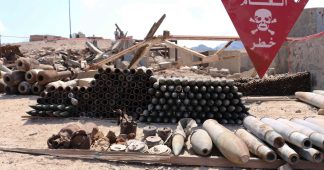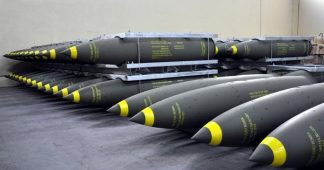By Olivia Riggio
March 3, 2022
NBC Nightly News (2/28/22) falsely reported that the United States has not used cluster bombs since 1991—when in fact the US has employed the weapons as recently as 2009, and has even more recently sold them to allied countries that have dropped them.
Cluster bombs are munitions that include numerous small explosive devices that land separately; the bomblets frequently explode long after they land, with devastating effects on civilians.
In the report, NBC correspondent Matt Bradley described possible war crimes committed by Russia in Ukraine, and noted that Russia appears to be using cluster bombs there. After quoting Steve Goose of Human Rights Watch (“We think that cluster munitions should never be used at all”), Bradley added:
“They’re banned by 110 countries, though not by Russia or the US. Still, the US hasn’t used them since the first Gulf War, over 30 years ago. They’re used by the Russians in Ukraine, another sign of this war’s growing savagery.”
This claim is inaccurate. Since the 1990–91 Gulf War, the US has dropped cluster bombs on Bosnia (1995), Serbia (1999), Afghanistan (2001–02) and Iraq (2003), according to the Landmine & Cluster Munition Monitor. The last reported US use of cluster munitions was against Yemen in 2009. (Before the Gulf War, the US used cluster bombs in Vietnam, Cambodia, Laos, Grenada, Lebanon, Libya and Iran.)
Moreover, the US has refused to join the 123 countries that have signed the Convention on Cluster Munitions that bans the use, production, transfer or stockpiling of these weapons. In 2017, the Trump administration canceled a plan to end the US military’s use of most cluster munitions, saying they are a “vital military capability” (Washington Post, 11/30/17). In 2019, the US abstained from a UN vote endorsing the ban.
The US military was buying cluster bombs until 2007, and US armsmakers were building them for foreign sale as late as 2016. According to a 2015 Human Rights Watch report (5/3/15), credible evidence indicated that the Saudi-led coalition used US-made and -supplied cluster munitions in airstrikes against Houthi forces in Yemen.
In 2015, following a FAIR Action Alert (9/3/15), the New York Times corrected a report that inaccurately claimed that the US was following the provisions of the Convention on Cluster Munitions, despite manufacturing and selling them.
Because these weapons release smaller bombs, they can’t be fired precisely and put civilians at a devastating risk. Additionally, when the smaller bomblets don’t detonate, they can pose postwar risk to civilians as de facto landmines. A 2003 Human Rights Watch report (3/03) estimated 14% of these bomblets are “duds” that put civilians at a grave risk.
Leftover bombs the US dropped during the Vietnam War in Laos are still being removed by humanitarian groups. The HALO Trust reports that about 20,000 people—40% of them children—have been killed or injured by dormant cluster bombs or other unexploded items since the war ended.
NBC described Russia’s use of these bombs as “savagery”—a word corporate media rarely if ever applied to the US’s use of these same weapons. In 2003, US TV news did no in-depth reporting on the US’s use of cluster bombs during the Iraq War (FAIR.org, 5/6/03). In 2011, FAIR (4/16/11) criticized the New York Times (4/15/11) for describing cluster bombs used by Libya’s Col. Moammar Gadhafi as “indiscriminate weapons” that “place civilians at grave risk,” while at the same time falsely claiming that the US only used them “in battlefield situations.”
ACTION ALERT: Please tell NBC to correct its misstatement that the US hasn’t used cluster bombs since 1991.
CONTACT:You can send messages to NBC Nightly News at nightly@nbcuni.com (or via Twitter: @NBCNightlyNews).
Published at fair.org
We remind our readers that publication of articles on our site does not mean that we agree with what is written. Our policy is to publish anything which we consider of interest, so as to assist our readers in forming their opinions. Sometimes we even publish articles with which we totally disagree, since we believe it is important for our readers to be informed on as wide a spectrum of views as possible.











